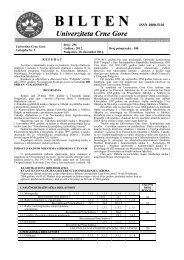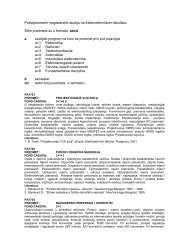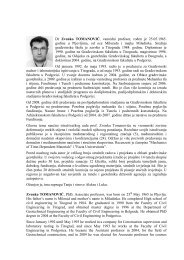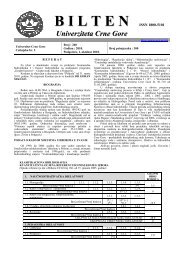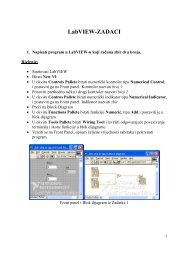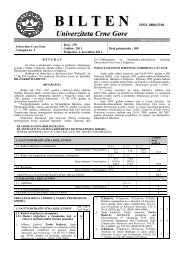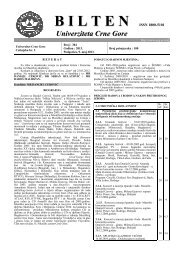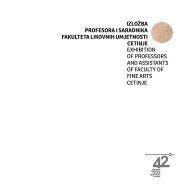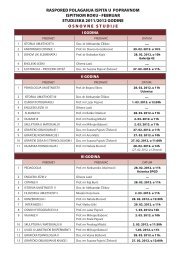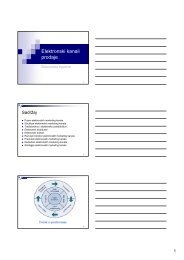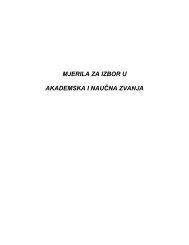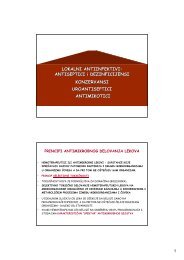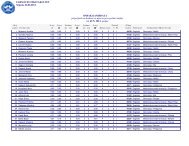WHO monographs on selected medicinal plants - travolekar.ru
WHO monographs on selected medicinal plants - travolekar.ru
WHO monographs on selected medicinal plants - travolekar.ru
You also want an ePaper? Increase the reach of your titles
YUMPU automatically turns print PDFs into web optimized ePapers that Google loves.
<str<strong>on</strong>g>WHO</str<strong>on</strong>g> <str<strong>on</strong>g>m<strong>on</strong>ographs</str<strong>on</strong>g> <strong>on</strong> <strong>selected</strong> <strong>medicinal</strong> <strong>plants</strong><br />
an active comp<strong>on</strong>ent. The MIC range of protolichesterinic acid, in free as<br />
well as salt form, was 16.0–64.0 μg/ml (14).<br />
Protolichesterinic acid, isolated from the thalli, inhibited the DNA<br />
polymerase activity of human immunodeficiency vi<strong>ru</strong>s-1 reverse transcriptase,<br />
with a median inhibitory c<strong>on</strong>centrati<strong>on</strong> (IC 50<br />
) of 24.0 μM (22).<br />
Antioxidant activity<br />
The antioxidant activity, reducing power, superoxide ani<strong>on</strong> radical scavenging<br />
and free radical scavenging activities of an aqueous extract of the<br />
thalli were investigated in vitro. The antioxidant activity increased with<br />
increasing amount of extract (from 50.0 to 500.0 μg) added to linoleic acid<br />
emulsi<strong>on</strong>. About 50.0, 100.0, 250.0 and 500.0 μg of aqueous extract of the<br />
thalli exhibited higher antioxidant activity than 500.0 μg of -tocopherol.<br />
The samples showed 96, 99, 100 and 100% inhibiti<strong>on</strong> of peroxidati<strong>on</strong> of<br />
linoleic acid, respectively. On the other hand, 500.0 μg of -tocopherol<br />
showed 77% inhibiti<strong>on</strong> of peroxidati<strong>on</strong> of linoleic acid emulsi<strong>on</strong> (23).<br />
Antiproliferative effects<br />
The effects of protolichesterinic acid, isolated from the thalli, <strong>on</strong> three malignant<br />
cell-lines (T-47D and ZR-75-1 from breast carcinomas and K-562<br />
from erythroleukaemia), as well as normal skin fibroblasts and peripheral<br />
blood lymphocytes were assessed in vitro. Protolichesterinic acid caused a<br />
significant reducti<strong>on</strong> in DNA synthesis, as measured by thymidine uptake,<br />
in all three malignant cell lines. The IC 50<br />
was between 1.1 and 24.6 μg/ml<br />
for protolichesterinic acid. The breast cancer cell-lines were more sensitive<br />
than K-562. The proliferative resp<strong>on</strong>se of mitogen-stimulated lymphocytes<br />
was inhibited with an IC 50<br />
of 24.5 μg/ml for protolichesterinic acid. These<br />
c<strong>on</strong>centrati<strong>on</strong>s are of the same order of magnitude as the MICs in the 5-<br />
lipoxygenase assay. Significant cell death (assessed by the 3-(4,5-dimethylthiazol-2-yl)-5-(3-carboxymethoxyphenyl)-2-(4-sulfophenyl)-2H-tetrazolium<br />
assay and trypan blue exclusi<strong>on</strong>) occurred in the three malignant<br />
cell-lines at c<strong>on</strong>centrati<strong>on</strong>s of protolichesterinic acid greater than 30.0 μg/<br />
ml. In K-562, morphological changes c<strong>on</strong>sistent with apoptosis were detected.<br />
At a c<strong>on</strong>centrati<strong>on</strong> of protolichesterinic acid of 20 μg/ml, up to 38%<br />
cell death was observed in mitogen-stimulated lymphocytes, but unstimulated<br />
lymphocytes were clearly less sensitive. In c<strong>on</strong>trast, the DNA synthesis,<br />
proliferati<strong>on</strong> and survival of normal skin fibroblasts were unaffected<br />
at doses of protolichesterinic acid of up to 20 μg/ml (24).<br />
Immune effects<br />
A polysaccharide, isolated from the lichen, and described as a branched<br />
galactomannan, with a backb<strong>on</strong>e composed of two st<strong>ru</strong>ctural elements;<br />
144



